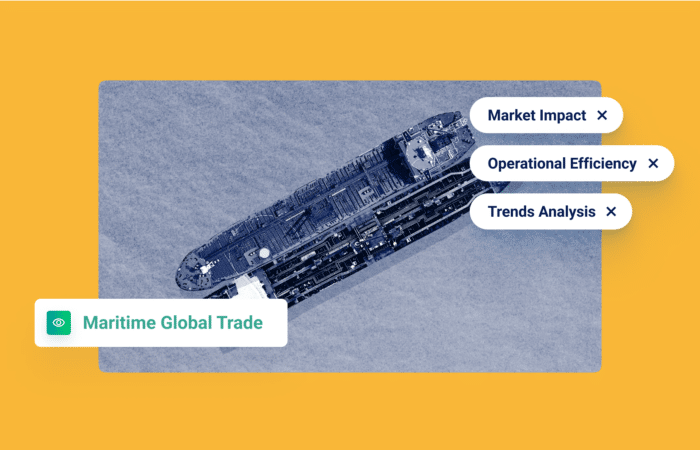Expert Insights on Maritime Compliance Amidst Global Disruptions

What’s inside?
The Red Sea crisis, political instability in Venezuela, a drought in the Panama Canal region, and the ongoing Russia/Ukraine war are just a few of the recent global crises affecting the maritime industry.
These events underscore the increasing complexity of maintaining compliance in a rapidly changing world and the volatile nature of international trade. Visibility into deceptive shipping practices and knowing who you’re doing business with is no longer nice to have, but non-negotiable.
Regulators are clamping down, as we’ve seen with the release of various guides and advisories recently. These include:
- The U.S. returned the Houthis to a list of terror groups.
- In light of the recent two-year milestone of the Russia/Ukraine war, all three major regulators (OFAC, OFSI, and the EU) added individuals, vessels, and entities to their sanctions lists. Over 200 companies were sanctioned, including Sovcomflot and 14 of its vessels.
- The G7 price cap coalition issued an enforcement detailing ways that market players evade the mechanism and information on how people can report breaches, said Reuters.
In our recent webinar, “From Disruption to Regulation: AI-Driven Strategies for Steering Maritime Compliance,” Simon Ring, Senior Commercial Director at Windward, hosted top industry experts:
- Eva Monard, International Trade Lawyer and Partner, Steptoe
- Lina Oswald, Head Sanctions, KYC & AML, Glencore
- Richard Baron, Group Head of Compliance, Socar Trading
Here’s a comprehensive recap of the insights shared, focusing on geopolitical tensions, regulatory landscapes, and the pivotal role of AI in enhancing compliance strategies.
Evolving Regulatory Focus
Regulators worldwide are shifting beyond list-based screening to address illicit activities and deceptive shipping practices directly. This evolution is a response to the sophisticated methods used to circumvent sanctions, especially in the context of the intensified focus on Russia. The impact on trade and supply chains is profound, necessitating a comprehensive understanding of the regulatory environment.
Steptoe’s Eva Monrad explained: “The EU sanctions in general are unprecedented against Russia. They have never been done before by the EU and, more generally, have never been done worldwide, that a jurisdiction imposed such significant trade restrictions on such an important trade partner – because Russia was the fifth largest trading partner of the EU before all of this.”
Breakdown of Recent Regulations
Monrad, specializing in EU law, provided an in-depth analysis of the EU’s response to these challenges. She highlighted how the 11th and 12th sanctions packages introduced stringent measures aimed at preventing the circumvention of sanctions, particularly in the maritime industry. A few key points she mentioned:
- EU sanctions packages: the 11th sanctions package saw a significant expansion in the prohibition of transit through Russia, affecting a wide range of products. This move aimed to clamp down on goods meant for other countries being diverted. The 12th package further tightened restrictions, targeting battlefield goods and imposing stringent due diligence requirements on maritime operators.
- Maritime industry focus: the sanctions have direct implications for the maritime sector, especially concerning the oil price cap and the prohibition against certain vessels engaging in suspicious behaviors, like turning off their transponders or engaging in ship-to-ship (STS) transfers in violation of sanctions.
- Enforcement and due diligence: the EU has ramped up enforcement measures, including limiting access to EU ports for vessels involved in circumventing sanctions. The 13th package, in particular, focuses on countering Russia’s access to tankers, highlighting the importance of due diligence in ensuring compliance across the supply chain.
The Real-World Impact of Sanctions on Maritime Operations
During the webinar, Windward’s Simon posed a pertinent question regarding the key challenges that businesses face daily in this turbulent climate and Glencore’s Lina Oswald shared her insights. Despite a general policy to avoid new trade contracts involving Russian oil and goods due to sanctions and reputational risks, her company faces dilemmas with legacy contracts not yet subject to sanctions.
She detailed the operational challenges, such as the initial reluctance of major shipping lines to enter Russian ports, forcing the need to find smaller operators willing to undertake such voyages. “Russia sanctions are very complex and are often changing. It requires that you have a strong compliance team with sanctions experts…In today’s environment, if you do operate in jurisdictions that have a higher risk than, for example, Europe, then it is a must that you have a sanctions expert.”
When answering Simon’s question above, Socar Trading’s Richard Baron added his perspective. “For us, it’s the constantly evolving landscape. One of the things people should be very mindful of is trying to be cute and arbitrage sanctions. I think that’s not a good idea.
In most trading houses, you have a lot of nationalities and exposure in many ways. You can’t say because I’m in Geneva I don’t care about UK sanctions. Whatever might be legal or not, you have to convince your banks and your finance partners of that…Any payments going through the financial system would be subject to a great deal of scrutiny.
The banks may well turn around and say you need to get proof from OFAC that you can do this. It’s not just the sanctions, it’s the reputational considerations around that, and it’s also the machinery around it in terms of your insurance and banking that also has to be lined up.”
Looking Forward
As stressed above by our speakers, the regulatory landscape continues to evolve, and staying informed and agile will be key to navigating the various challenges ahead. Thank you to all who attended and to those who continue to rely on us as your trusted advisors in maritime compliance. Your commitment to maintaining the highest standards of compliance drives us to keep delivering AI-driven insights and access to industry-leading expertise.
There was so much more to the webinar than what can be covered in one blog post. Watch the full webinar and make sure your business isn’t at risk of not being compliant…












